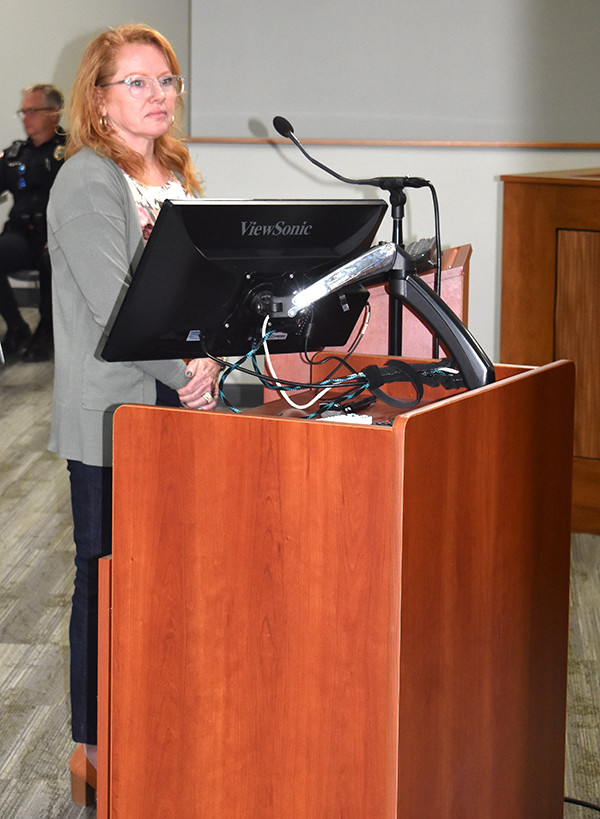Council moves forward with restarting CDBG housing grant process

T-R PHOTO BY ROBERT MAHARRY City of Marshalltown Housing and Community Development Director Deb Millizer stands before the city council during Monday night’s meeting. The council voted unanimously to proceed with spending $15,000 in Local Option Sales Tax (LOST) funds to pursue grant administrator services for a Community Development Block Grant — Disaster Recovery (CDBG-DR) housing application through the Iowa Economic Development Authority (IEDA).
Almost six months after terminating a $2 million development agreement with Huegerich Construction Company for the construction of townhouse units as part of a Community Development Block Grant for Disaster Recovery (CDBG-DR) through the Iowa Economic Development Authority (IEDA), the Marshalltown city council moved forward with committing $15,000 in Local Option Sales Tax (LOST) funds for grant administrator services to pursue the same funding source once again.
Housing and Community Development Director Deb Millizer explained that Huegerich still owns the two properties that qualified for the previous grant funding — one on East South Street and another on North 4th Avenue — so if they reapply, they would need to find new sites for projects. Millizer said a key to being reconsidered is a demonstration of “project readiness,” including hiring a certified grant administrator, and she has secured a commitment from Ralston Homes and Todd Richardson, who have previous experience with the CDBG-DR grant.
Ralston and Richardson previously built a series of duplexes in Linn County, which is what they would prefer to do in Marshalltown as well. From there, Millizer laid out her request for $15,000 in LOST funds to cover the cost of procuring a grant administrator through a Requests for Proposals (RFPs).
She did warn that the amount is not reimbursable, and the IEDA may not open the grant back up at all — nonetheless, to even be considered, the city would need to go through the process again.
“We do have the risk of spending $15,000, but we do have the possible reward of up to $2 million,” Millizer said.
As she opened the floor up for questions, Councilor Melisa Fonseca asked Millizer about the locations of the proposed duplexes, and she said the “tentative plan” would be to put them on storm-damaged lots currently owned by the city, lowering the cost of development and the price point for homebuyers. In response to another question from Fonseca, she added that the units would be sold to families as owner-occupied housing. The plan is to construct six duplexes for a total of 12 housing units.
Fonseca then indicated that she would support the application to increase housing options in Marshalltown and put more property owners on the tax rolls. Millizer also suggested infill housing in areas that were impacted by the natural disasters.
Councilor Greg Nichols asked for clarification on the previous project, and Councilor Mike Ladehoff wondered if the city would have trouble attracting contractors due to the requirements. Millizer reiterated that she already has the precommitment from Ralston and Richardson, and City Administrator Carol Webb said they have extensive experience with similar projects.
Councilor Gary Thompson asked if other eligible counties are applying for funding, which Millizer didn’t know as she called it a “chicken or the egg” situation and a matter of following the IEDA’s instruction.
During the public comment period, Tim Bradbury expressed concern that if $2 million only funded 12 units, the cost would be over $300,000 per unit and not affordable for a “normal Joe.” Millizer said the grant helps offset the cost of the units, which would end up costing no more than $175,000, and she added that the IEDA is also interested in infill housing to lower the price point.
Thompson asked if $175,000 per unit was “achievable” for low-to-moderate income individuals considering Marshalltown’s poverty levels, and Millizer replied that the IEDA wouldn’t invest its money if they didn’t believe it to be achievable. Ward One Council Candidate Marco Yepez-Gomez expressed his support for hiring a grant administrator, citing a nationwide “housing crisis” that doesn’t get much acknowledgement in the media.
He also suggested utilizing duplex design templates to make it easier for future developers to build similar units. Another public commenter, Doris Kinnick, did not believe her daughter and son-in-law would be able to afford a $175,000 house.
“As their first house, that ain’t happening. It’s gotta be lower,” she said.
After Fonseca made a motion to proceed with committing the $15,000 in LOST funds, it passed by a unanimous 7-0 vote. Mayor Joel Greer then commented that if a family “moves up” to a home in the $175,000 price range, it can free up cheaper units for first time homebuyers.
Millizer noted that $175,000 is the maximum cost, and the units could end up being cheaper than that.
——
Contact Robert Maharry
at 641-753-6611 ext. 255 or
rmaharry@timesrepublican.com.





